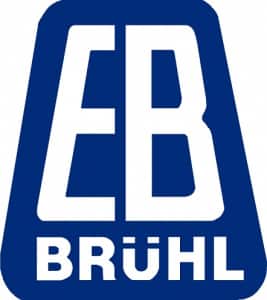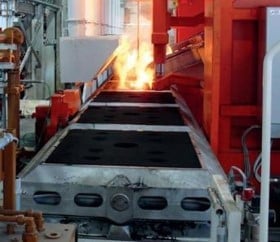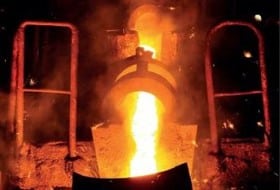Eisenwerk Brühl GmbH: Almost 100 years of foundry history in the Rhineland
Eisenwerk Brühl is a plant founded in 1927 in Brühl, Rhineland, Germany. With a capacity of 80 tons of liquid iron per hour, 5,000 molds, and 200,000 cores per day, the Brühl-based company employs more than 1,500 people, making it the largest employer in the region. The ironworks was founded almost 100 years ago by Georg Sandmann, a pioneer in the steel industry at the time. Even then, Sandmann had the vision that cars could become the world’s most popular means of transportation, which is why the company specialized in the production of cylinder crankcases and cylinder heads at an early stage.
The vision is still confirmed today. Demand grew quickly and intensive cooperation with designers from the automobile manufacturers, strict quality controls, targeted market orientation and the use of new technologies quickly led to the company becoming one of the most important automotive suppliers in history.
Picture: Eisenwerk Brühl GmbH
Cylinder crankcases and cylinder heads for the global market
The company’s product portfolio includes various engine blocks, cylinder crankcases, and cylinder heads for the global automotive market. Eisenwerk Brühl’s engine blocks are high-grade products that meet the most stringent requirements in terms of product quality. The company has a long tradition of manufacturing high-quality cast iron parts and is known for its excellent foundry technology.
The product range is based 100% on cast iron materials whose material properties can be optimally matched to the end product. Whether Audi, Fiat, Ford, Opel, GM, Skoda, Suzuki, or Volkswagen – products from Eisenwerk Brühl can be found in numerous vehicles of well-known automotive manufacturers worldwide.
Engine blocks for the automotive industry – quality is a must
The engine block is the heart of a modern powertrain. It is responsible for converting the thermal energy of the fuel into mechanical energy that powers the car. The engine block must be made of high-quality materials to withstand the intense heat and pressure generated by the combustion process. An engine block must withstand particularly high thermal and mechanical stresses. Compliance with a quality standard is therefore not just a “nice to have” in the production of engine blocks, but an essential safety feature. The requirements on the part of the automotive industry are correspondingly high. Modern engines must also meet the ever-increasing demands of the automotive industry. These include, for example, lower fuel consumption and fewer emissions, which ultimately calls for weight reduction and optimized combustion processes combined with more power and less displacement. Eisenwerk Brühl is meeting this challenge with a consistent focus on its core competence, a clear strategic positioning, and continuous further development and optimization.
To ensure the quality of the end products, the company relies, among other things, on continuous process monitoring throughout the entire production chain. Standardized quality assurance systems and highly qualified and motivated personnel ensure that only components of the highest quality leave the plant. To this end, various measures are taken in production for quality inspection and thus quality assurance. About every 6 minutes a chemical analysis is carried out in the in-house laboratory, and about every 10 minutes a thermal analysis. Quality documents are drawn up for increased self-monitoring, which serves both quality assurance and process optimization. The high product quality, but also the delivery reliability are documented by multiple awards and certifications.
Simplified data management with LIMS from Fink & Partner
Considering the amount of data generated in the ironworks laboratory in hundreds of analyses every day, it is not surprising that the company decided to introduce LIMS software in 2020. A lot of analysis data now converges centrally in the LIMS database and is stored securely. Measurement data is now collected electronically via appropriate instrument interfaces.
For Mehmet Ucur, head of the laboratory, the LIMS also offers other significant advantages independent of pure data management. Managing data is an important aspect for him, but it becomes particularly exciting when it comes to evaluating the data obtained and using it accordingly:
“The LIMS gives us the opportunity to identify trends at an early stage and, above all, to recognize dependencies and react to them, for example, in order to optimize processes.”
Bild: Eisenwerk Brühl GmbH

Philip Moerke, CEO with extensive experience in LIMS software, combines technical expertise with a clear vision for the future of laboratory information management. His commitment to developing user-friendly LIMS solutions has helped to make laboratories more efficient and data management more accurate. With a deep understanding of the needs of modern laboratories and a hands-on approach to problem solving, Philip Moerke is a trusted partner for laboratories looking for innovative solutions. He is known for his ability to communicate complex technical concepts in an understandable way, making him a valued expert in the industry.
![[FP]-LIMS Software](https://fp-lims.com/wp-content/uploads/2020/06/Fink-Partner-LIMS-Software-Firmen-Logo-e1592470427959-300x250.png)





